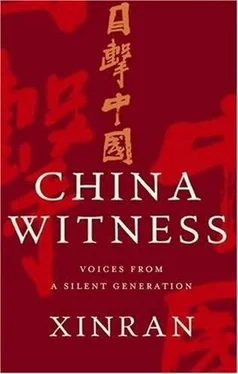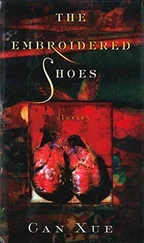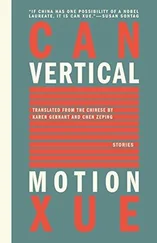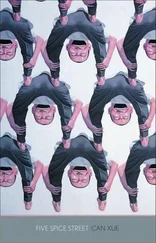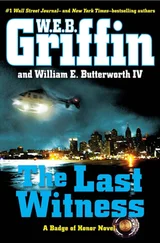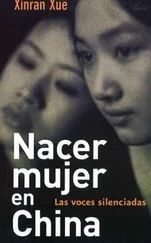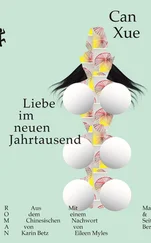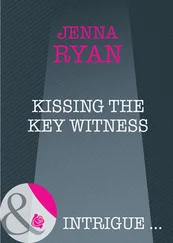Those bright eyes dulled. I changed the subject. "Now that your children have grown up, do they help you out with money?"
She threw her head back. "I don't want their money, I'm richer than they are. Last week, when my great-grandson got married, I gave him 5,000 yuan!" [1]Thinking of her family again cheered her up.
"How many of your children and grandchildren have studied Chinese medicine like you?" I pictured her lecturing a classroom full of her descendants.
"None of them!"
"Why?"
I could hear no regret in Yao Popo's voice. "They say it's not a proper job, there's no money in it, or respect."
I supposed that their scorn was directed at her acrobatic past. Traditionally, it was thought that athletes and dancers were physically strong because they were mentally weak. Although the Chinese have always liked entertainment, they don't respect entertainers. I was surprised to discover the prejudice had survived into the twenty-first century.
"But you earn more money than them. And you've led such an exceptional life. Everyone knows you, respects you round here."
She bent over to whisper into my ear: "They don't know anything about my past, about the money I've earned; I've never told them. They don't think I know anything; they think I'm just an odd-job woman. Whenever I give them money, they always think it's from my husband, or my father. But I've earned a lot more money than them over the years. Men only know how to treat old illnesses, they can't adapt to new ones. They're no good at business, either. They're too proud to work on a stall."
"What do you mean by old and new illnesses?"
"Old illnesses are the ones everyone's known about for hundreds and thousands of years – the symptoms tell you straight away what they are. Every family used to have a grandfather or a grandmother who had a bit of medical know-how in the old illnesses: for example, if a person's stomach was sore, they'd best not take any medicine or eat anything. Just drink warm water, rest the stomach and it would soon get better. Stomach problems are at the bottom of most things: headaches, backaches, sleeping problems. Settle the stomach, and everything else will right itself. But these days, I see more and more new illnesses: sore eyes and back from sitting in front of the computer, or in an office, acne from eating too much McDonald's, stomach upsets from too much travelling, earache from too much karaoke, exhaustion from too much driving…"
Looking down at my watch and seeing that Toby had been waiting almost an hour, I decided to interrupt Yao Popo's list of modern complaints. "After working hard for so many years, are you planning to retire?" My bottom was numb from sitting on that small wooden stool. I could barely imagine how she could have sat there for seven or eight hours every day for most of her working life.
"Why would I do that? My foster-father's well over ninety and he's still treating patients; his eyes and ears are still good – he's probably healthier than I am. My husband and I are rushed off our feet with the business – we now stock four hundred different herbs. Every day we sell at least thirty or forty different varieties, sometimes over a hundred. That's tens of thousands every year… Is he taking a photograph of us?" On discovering Toby aiming his camera at us, Yao Popo suddenly drew herself up and sat facing forward, rigidly straight-backed on her stool, hands folded neatly on her knees. "Has he finished yet?" she whispered to me as she posed. "Has he finished?"
When I told her Toby was done, she relaxed back into her usual posture. While she was clearly in good health, her shoulders had the inevitable hunch of old age.
"Tell your husband to photograph me straight-on. I broke my nose when I slipped doing acrobatics in my youth. My children never got to see how pretty I once was."
Her vanity took me by surprise. The Chinese prize modesty above all other virtues. If we work with other people, we're always trying to pass the credit for successes and achievements onto them; if we do a thing on our own, we'll say we did it badly. A mother will say at her own daughter's wedding how ugly her child is, or how much less clever than other people's children. Her regret for her lost beauty was the first time I had encountered such frankness in twenty years.
I told her I had to go because my son and two other students were waiting for me, but that I wanted to bring PanPan to see her after lunch. She clearly didn't believe she'd see me again. "Come back if you've time," she shrugged. "You look like a busy person."
A little while after noon, PanPan, a couple of female students and I reappeared in front of her shop. "So you really did come back," she beamed at us. "And with these fine young people! Sit down, I've stools for all of you."
She seemed to have just finished her lunch: an empty bowl and pair of chopsticks were lying in the bamboo basket next to her, along with a handful of spring onions and some wild mountain peppers. The Hunanese can eat furiously spicy food. Perhaps she was taking advantage of a lull in business to prepare dinner. An ancient Thermos flask stood next to the basket, alongside a rubbish-filled shopping bag.
I told her that PanPan wanted to give her a poster of London. Also, one of the students, Y, wanted something for her skin allergy, while the other student, K, wanted to take some professional-quality photos of her. Though I'd expected her to refuse to be photographed, she seemed delighted and immediately agreed, even thanking us for our time.
She was very taken with the poster of Tower Bridge. "What a beautiful building!" she exclaimed to herself. "The bridge opens, you say? I've never seen anything like it! What country is London in? Why's it called London? What does it mean?" As I had no answers to her questions, I pushed Y forward. "Could you take a look at her?"
Y pulled up her shirt. Her skin looked terrible, covered in great patches of suppurating lumps and bumps. Without blinking an eye, Yao Popo beckoned her inside. "Three doses of my medicine and it'll be better."
Y and I followed her doubtfully into the shop, where she got down from a shelf a wooden box filled with ground walnuts, peanuts and red dates, on which a number of small brown-winged insects were feeding. Yao Popo then got Y to pick out twenty-one of the fattest, liveliest insects, which she deftly caught and divided between three blue-and-white medicine capsules. She instructed the student to take the three capsules over the course of a single day – checking that the insects were still alive before swallowing them – and to take the first now. "Don't be afraid," she told Y as she passed her the first capsule, "I've fed them only on nuts and fruit. They're much cleaner inside than us."
Y looked first at the insects wriggling inside the capsule, and then questioningly at me. I didn't know what to say to her. After a brief hesitation, she asked me to pour her a large cup of water. She took a deep breath then, still rather nervously, swallowed the capsule down. I was impressed by her intrepidity – a rare quality among her generation of cosseted only children.
She obeyed the Medicine Woman's instructions to the letter, swallowing the remaining two doses over the next twelve hours, checking both times that the insects were still alive. Very soon, her itching stopped; a couple of days later, her scabbed skin miraculously healed over.
Just before we said goodbye, Yao Popo told us about the unhappiest and the happiest times in her life. Her first great source of unhappiness had been growing up without parents, without a home of her own, and with only a damp mud floor to sleep on. The second hardest thing had been bringing up seven children in a tiny room of only twelve metres square. While they were small, she'd not had a moment's peace, day or night. The third had been breaking the bridge of her beautiful nose. A good nose, she said, was a woman's most important feature. The single thing that brought her greatest happiness was that all her children had survived the famine of the 1950s and '60s in which so many millions had died, and that her grandchildren had gone to school and had children of their own. The second great blessing for which she was thankful was that her husband had never hit her. Her third source of pleasure over the years had been sitting in front of the shop, day in, day out, watching the world changing around her.
Читать дальше
